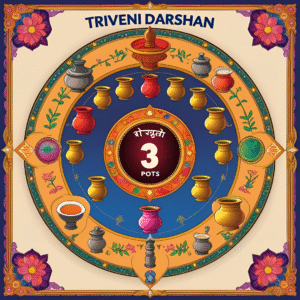
Sadhana Starter Kit
Sadhana means disciplined spiritual practice—a sacred effort to connect with the Divine, refine the mind, and realize the Self. In Vedic and yogic traditions, sadhana is considered the foundation of inner growth and the gateway to liberation (moksha).
Importance of Sadhana
Without discipline and practice, knowledge remains only intellectual. Sadhana transforms knowledge into experience, channeling thoughts, actions, and energy toward higher goals. It cultivates purity, focus, humility, and devotion.
Types of Sadhana
-
Mantra Sadhana – Repetition of sacred sounds to awaken divine vibrations.
-
Dhyana Sadhana – Meditation to quiet the mind and realize inner truth.
-
Puja & Ritual Sadhana – Worship of deities through offerings and devotion.
-
Jnana Sadhana – Contemplation on scriptures and self-inquiry.
-
Seva Sadhana – Service done selflessly as an offering to the Divine.
Goals of Sadhana
-
Purification of mind and body
-
Overcoming karmic patterns and limitations
-
Awakening inner strength and intuition
-
Deepening connection with the Divine
-
Realization of one’s higher purpose
Benefits of Sadhana
-
Brings clarity, peace, and focus
-
Helps in overcoming fear, stress, and negativity
-
Invites blessings, prosperity, and inner stability
-
Balances material life with spiritual growth
-
Ultimately leads to self-realization


Traditional Steps in Sadhana
-
Āsana – Sitting in a stable, clean, and sacred posture (like Padmasana, Siddhasana) to maintain focus and energy.
-
Āchamana – Purification by sipping sanctified water with mantra recitation.
-
Prāṇāyāma – Regulation of breath to calm the mind and awaken prana (life-force).
-
Nyāsa – Ritual placement of mantras on different parts of the body, invoking divine energy within.
-
Dhyāna – Meditation upon the chosen deity or form of the Divine.
-
Mantra Japa – Repetition of the mantra using a japa mala, focusing on sound vibration and divine presence.
-
Pūjā / Upachāra – Offering flowers, incense, lamp, food, and other articles to the deity with devotion.
-
Mārjana – Sprinkling sanctified water for purification and removal of negative energies.
-
Tarpana – Offering water or symbolic items to deities, ancestors, rishis, or divine forces to express gratitude and balance karmic debts.
-
Homa (Havan) – Sacred fire ritual where offerings (ghee, herbs, mantras) are made into fire, symbolizing transformation and surrender.
-
Ārati – Waving of lamp before the deity as the culmination of devotion.
-
Prasāda – Partaking of blessed offerings, symbolizing receiving divine grace.
-
Kṣamā Prārthanā – Closing prayer seeking forgiveness for any mistakes during the ritual.
✨ These steps can be shortened for daily practice or expanded during special sadhanas and initiations. Each act represents a journey—from purifying the body and mind, invoking divinity within, offering devotion outwardly, and finally receiving blessings inwardly.
Guru–Shishya Parampara
Traditionally, sadhana was always practiced under the guidance of a Guru (teacher). The Guru transmitted not just techniques but also spiritual energy and protection, ensuring the student’s progress while avoiding pitfalls. This lineage is still vital today—where the Guru lights the path for the seeker.
Contents of a Sadhana Starter Kit
A thoughtfully prepared Sadhana Starter Kit supports beginners and practitioners alike. It may include:
-
Mantra Book / Japa Mala – for mantra recitation.
-
Yantra or Idol – as a focus for devotion and meditation.
-
Incense, Camphor, Ghee Lamp – to purify space and invoke divine presence.
-
Rudraksha or Sphatika Beads – for spiritual energy and protection.
-
Small Pooja Items – bell, kumkum, sandal paste, and sacred cloth.
-
Guidance Material – instructions, prayers, or scriptural excerpts for daily practice.
✨ In essence, a Sadhana Starter Kit is not just a collection of items—it is a sacred toolkit to begin one’s journey towards discipline, devotion, and divine realization.


 Saptamukhi Rudraksha (Nepal)
Saptamukhi Rudraksha (Nepal)  Trijuti Rudraksha (3 Beads in 1) – Rare
Trijuti Rudraksha (3 Beads in 1) – Rare  Panch-Mukhi Rudraksha (Nepal)
Panch-Mukhi Rudraksha (Nepal)  Triveni Darshan Package (3 Consultations)
Triveni Darshan Package (3 Consultations)  Shani Shanti Puja Pack
Shani Shanti Puja Pack  Eka-Mukhi Rudraksha (India Premium Oval)
Eka-Mukhi Rudraksha (India Premium Oval)  Trayodasha-Mukhi Rudraksha (Nepal)
Trayodasha-Mukhi Rudraksha (Nepal)  Rudraksha Bracelet with Silver Caps
Rudraksha Bracelet with Silver Caps  Baby Naming & Nakshatra Analysis
Baby Naming & Nakshatra Analysis  Gayatri Yantra 4" Copper
Gayatri Yantra 4" Copper